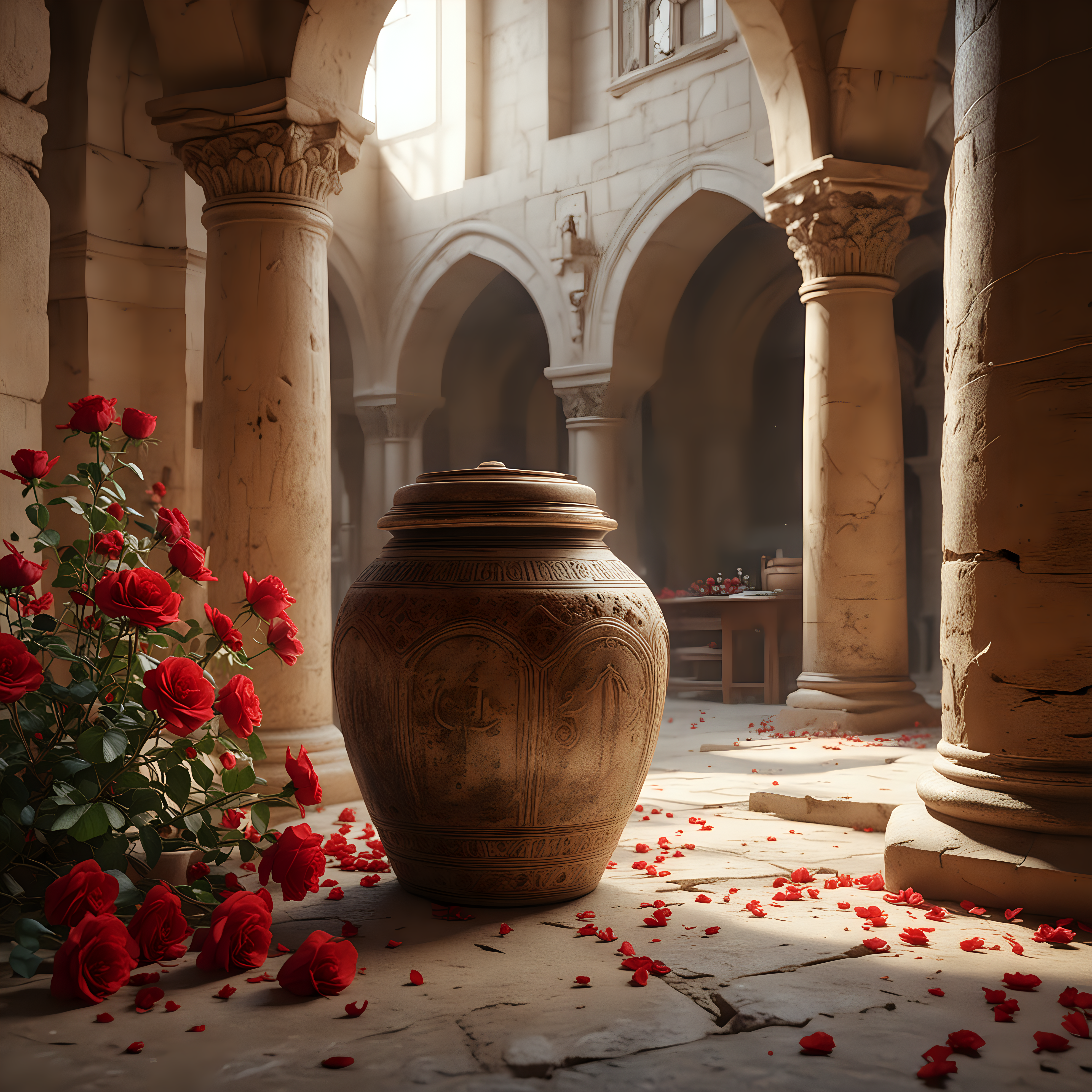Last week we explored Spiritual Consolation, that enriching state where you feel connected to the Divine. It’s that uplifting sensation of being ‘in tune’ with your soul’s deepest calling. And now, we’re pivoting to the concept of Spiritual Desolation, an experience characterized by a feeling of disconnection and distance from God.
From this post, you will gain:
- A deeper understanding of the natural ups and downs of the spiritual life so you can have more steadiness in your practice and inner peace.
- The ability to recognize and be aware of the signs of Spiritual Desolation.
- Perspective on the commonalities and important distinctions between Depression and Spiritual Desolation.
- An understanding of 3 major causes behind Spiritual Desolation.
- Newfound spiritual confidence so that you’ll feel less alone and more capable of facing the emptiness of Desolation when it hits you.
Spiritual Desolation Recap
To quickly recap, spiritual desolation is related to the concept of the Discernment of Spirits, developed and taught by the 16th-century mystic St. Ignatius of Loyola. It involves identifying and distinguishing between two states of the soul: Spiritual Consolation and Spiritual Desolation.
Spiritual Consolation is the state in which you feel intensely close to God, as if you’re being enveloped in a warm comforting embrace. Spiritual Desolation, meanwhile, is a state of being disconnected from God, feeling distant from God. Now, obviously one of these states sounds better than the other, right? But it’s best not to think of it that way.
There is no straightforward “good” and “bad” when it comes to your relationship with God. Both Consolation and Desolation, each in their own ways, are integral parts of your relationship with God. It is natural to experience both states and important to recognize each one for the valuable signals they respectively are sending you.
Feeling Disconnected From God
There are several reasons for why God is often anthropomorphized—depicted as a human being. It can be useful to imagine God in this way, from the perspective of mysticism, to provide yourself with a familiar framework for understanding your relationship with God, especially early on in your spiritual journey. In other words, imagine your relationship with God as analogous to your relationships with people.
There are probably at least a few important people in your life—close friends, family members—with whom you don’t communicate as much as you feel you should or would like to. With so many relationships to manage in our lives, and so many personal responsibilities to juggle, it is only natural to lose touch with these people from time to time. But it is in those moments of feeling disconnected that we realize how important that relationship is. There is a feeling of emptiness, but that emptiness exists only because the relationship itself exists.
You might go weeks or months or even years without speaking to that special person, but then one day they pop into your head. It’s mostly fond thoughts, but also with a tinge of sadness and emptiness. You might feel a bit guilty for not re-connecting with them sooner. Maybe you’re even afraid to pick up the phone and make that call, for fear that they will want nothing to do with you now because of how long you’ve let this period of disconnectedness hang around for.

But, of course, that is almost never the case. Strong bonds are built on unconditional love, and that’s the kind of relationship you have with God. Spiritual Desolation is there to remind you that you have become distant from God. But don’t let it get you down! Let it be the thing that motivates you to pick up the phone and reestablish your connection!
Desolation vs Depression
Of course, I don’t mean to sugarcoat the experience of Desolation. The feeling of being distant from God is often one of profound emptiness. You have become disconnected in your relationship with not just an important person, but rather the most important relationship in your life.
In fact, the feelings of emptiness and disconnectedness that accompany Spiritual Desolation can be so severe that this state is sometimes confused with depression. So, the first thing to point out is that Desolation is not the same as depression. The easiest way to explain this is to point out that being disconnected from God is the defining characteristic of Desolation, whereas it is just one of many possible symptoms through which depression may manifest itself.
However, despite being far from identical, Desolation and depression often share the following in common:
- Loss of meaning in life
- Guilt and fear
- Debilitating impact
I know that many of you who are listening to the Holy Rebels Podcast work in professions that have to do with healing, health, ministry, or areas that are strongly focused on people. I’m sure you have seen how a loss of meaning in life can completely transform the way someone views their external circumstances in life. This can give way to a lot of complicated feelings like guilt—”It’s my fault I feel this way”—and the fear that things might never get better.
As I said, it’s natural to blame yourself for losing touch with that special person in your life, and to keep delaying your efforts to reconnect with them out of feelings of fear.
Spiritual desolation can prompt similar responses. And yes, all of this can be quite debilitating for people. So, even though it’s important not to oversimplify Spiritual Desolation as “bad”—just as it can be dangerous to stigmatize depression as “bad”—so too is it important not to dwell in that state for too long. That’s where the Discernment of Spirits comes in as a healthy action plan for Spiritual Desolation.
The Discernment Of Spirits: 3 Steps For Responding To The Emptiness Of Spiritual Desolation
The discernment of spirits can be broken down into a 3-step plan for responding to the emptiness of spiritual desolation.
- Step 1. Be Aware: Observe your experience without judgment. Acknowledge whether you’re in a state of Consolation, feeling close to God, or in Desolation, feeling distant from God.
- Step 2. Understand: What factors are contributing to your current spiritual state?
- Step 3. Take Action: Armed with awareness and understanding, it’s time to respond!
Awareness: Natural Cycles Of Emptiness And Fullness
Observing your experience without judgment means, again, not oversimplifying spiritual consolation as “good” and desolation as “bad.” If you think of these states in this way, then it’s hard to be honest with yourself. Oftentimes, we shrink away from “bad” things with a sense of denial, as if those things will go away on their own if we just ignore them. That’s not how Desolation works.
A healthier way to view these two spiritual states is as two aspects of a natural cycle, like seasons of the soul.
Spring is an ideal time for productivity because everything around us in nature is blooming. The days get longer, we spend more time outdoors, and there’s fresh energy in the air. Winter is an excellent time for rest and reflection because there’s less sunlight. It’s a natural time to recover and to live on the fruits that we harvested in the warmer seasons. In the same way, Consolation is like your soul’s Summer, and Desolation is like your soul’s Winter.

Another analogy you can think of is the natural cycle of the moon’s phases, as described poetically by Red Pine in his translation of Lao Tzu’s Tao Te Ching.
“The symbol Taoists have used since ancient times to represent the Tao, [the yin-yang symbol], shows the two conjoined phases of the moon […] Every month the moon effortlessly shows us that something comes from nothing. Lao-tzu asks us to emulate this aspect of the moon—not the full moon, which is destined to wane, but the new moon, which holds the promise of rebirth.”
Red Pine, translator of Tao Te Ching
From this perspective, it is actually Desolation, not Consolation, that presents the greatest opportunity for spiritual growth.
Understanding: 3 Causes Of Desolation (And Actions You Can Take)
Just as Summer turns to Fall and Winter, Consolation can’t last forever. The Qur’an points out,
“Man was truly created anxious: he is fretful when misfortune touches him, but tight-fisted when good fortune comes his way.”
The Qur’an, 70:19-21
When Consolation fades, it feels as if you’re wandering through life without a map. Where once there was an intimate dialogue with God now lies an empty space, a vacuum. But it’s important to resist that natural human impulse to become too fretful when this happens, just as it’s important to not latch on too tightly to those moments of Consolation but instead to be grateful for having received them in the first place.
Armed with an awareness that Spiritual Desolation is a natural phenomenon that was destined to befall you at some point, the next step is to understand why you are in a state of Desolation in this moment and what you can do about it.
REASON 1: You’re Not Tending to Your Spiritual Garden
Think of your spiritual life like a beautiful, thriving garden. Just as a garden needs regular watering, weeding, and sunlight, our souls need prayer, reflection, and connection with God.
One of the main symptoms of Desolation is feeling pulled toward temporary comforts—those small, earthly pleasures that promise satisfaction but leave you feeling an even deeper emptiness. Reflect on your recent behaviors, motivations, goals, and actions in life. And, of course, take note of the state of your relationships with people as well. You might not be feeding your garden the right nutrients!
REASON 2: Learning To Love God Beyond the “Feel Good” Moments
When Consolation withdraws, it’s an opportunity to cherish God beyond the blessings you associate with the Divine. Desolation nudges you to evolve your relationship with God to one that’s not reliant on spiritual highs but is steady, rooted in unconditional love. Imagine it as learning to love a friend for who they truly are, not just for the joy they bring into your life. So this is an opportunity to learn about unconditional love, which is the essence of God Itself.
Somewhere along the way, your spiritual practices may have stalled out, become stale. Maybe you just need to freshen things up—to approach God in a new way, to splash a little fertilizer on your garden!
REASON 3: Recognizing God as the Source of All that is Good
Desolation is a reminder that every joy, every moment of comfort, every spiritual achievement in your life originates not within you, but within God. Remember, Spiritual Consolation is not just about feeling all warm and fuzzy inside. In fact, it’s not about what’s inside of you at all. It’s a feeling of being drawn out of yourself and pulled closer to God. If you’re in a state of Desolation, it’s possible that you’ve just been a bit too fretful over your own ambitions, successes, and failures. You’ve lost that sense of awareness that you’re not the only force that’s guiding the way your life unfolds.
As the gardener, you have an important role to play, but don’t give yourself too much credit—you don’t control the weather, after all!

Action: Responding To The Emptiness Of Spiritual Desolation
According to the Book of Proverbs (24:16), King Solomon, regarded as one of the wisest men in the Bible, claims that “A righteous man falls down seven times and gets up.”
If you’re in a state of spiritual desolation, know that this will not be the last time it happens (and it’s probably not the first either!). Responding to the emptiness of Spiritual Desolation means knowing that this is a challenge with which you will be confronted and tested time and time again. Over time, you may come to recognize something interesting about the “action” step.
It doesn’t always involve making big changes.
Sometimes, the most profound action is simply practicing awareness and understanding, choosing to trust in the process of spiritual growth, maintaining your practices, and being gentle with yourself. Try to practice gratitude for these phases of emptiness, and you might learn something valuable from them.
If you want to deepen your understanding of the Discernment of Spirits, Consolation, and Desolation, then consider walking the literal path of St. Ignatius of Loyola as part of the Dancing Spirits Camino program. This is a pilgrimage of the soul, a quest for alignment, resilience, and a deep, abiding connection to God. If you feel called to join me, send me a message on any platform.
Frequently Asked Questions
Spiritual emptiness is a state of disconnection from God, also known as spiritual desolation. It is natural for all of us to experience spiritual emptiness from time to time. However, the notion that spiritual emptiness is a definitive disconnection from God is fundamentally an illusion because your connection to the divine is constant. Even during times when you might feel isolated or distant, the bond remains unbroken. It’s essential to recognize that these feelings of emptiness are temporary and do not reflect the true state of your spiritual relations. This awareness can help transform your perception, allowing you to realize that, deep within, you are always in communion with a higher power, regardless of the emotions or circumstances you face. Learn how to overcome spiritual emptiness in Wisdom of The Mystics.
One of the most profound states of inner emptiness we experience is the emptiness of spiritual desolation, where it seems as though we are disconnected from God. However, this disconnection is merely an illusion, as we are never truly separated from the divine presence. The discernment of spirits provides a path for recognizing this inherent connection, helping us to move beyond the perceived emptiness no matter how deep it may feel. Learn how to overcome spiritual desolation in Wisdom of The Mystics.
It may not be totally accurate to say that God “gives” us desolation, but spiritual desolation can be seen as a sort of gift in the sense that it invites us to rethink which things in our lives make us more connected to God, which things make us more disconnected, and what we can do to return to a state of connection, otherwise known as spiritual consolation. Spiritual desolation, therefore, offers us important opportunities for spiritual growth.
Desolation can manifest itself in a range of symptoms, which are sometimes compared to the symptoms of depression, even though these are two totally different conditions. Nevertheless, some of the symptoms of spiritual desolation can include intense sadness, guilt, fear, existential despair and loss of meaning, all of which can have a debilitating impact on our lives. That’s why it is important to find ways to pass through moments of spiritual desolation, even though they are natural and bound to occur from time to time.
Desolation is overcome first through the discernment of spirits, which involves a three-step process. The first step is to be aware: pay attention to your thoughts, feelings and sensations in your body. Next, you must understand whether you are experiencing spiritual consolation or desolation, which will help you identify the root cause of your current state. Finally, take action: recognize why your spirit is in desolation and implement steps to reconnect with God, moving towards spiritual consolation. This process, when practiced regularly, allows you to effectively address desolation and nurture a deeper spiritual connection. Learn to overcome desolation in Wisdom of The Mystics.
Paragraph
Paragraph


